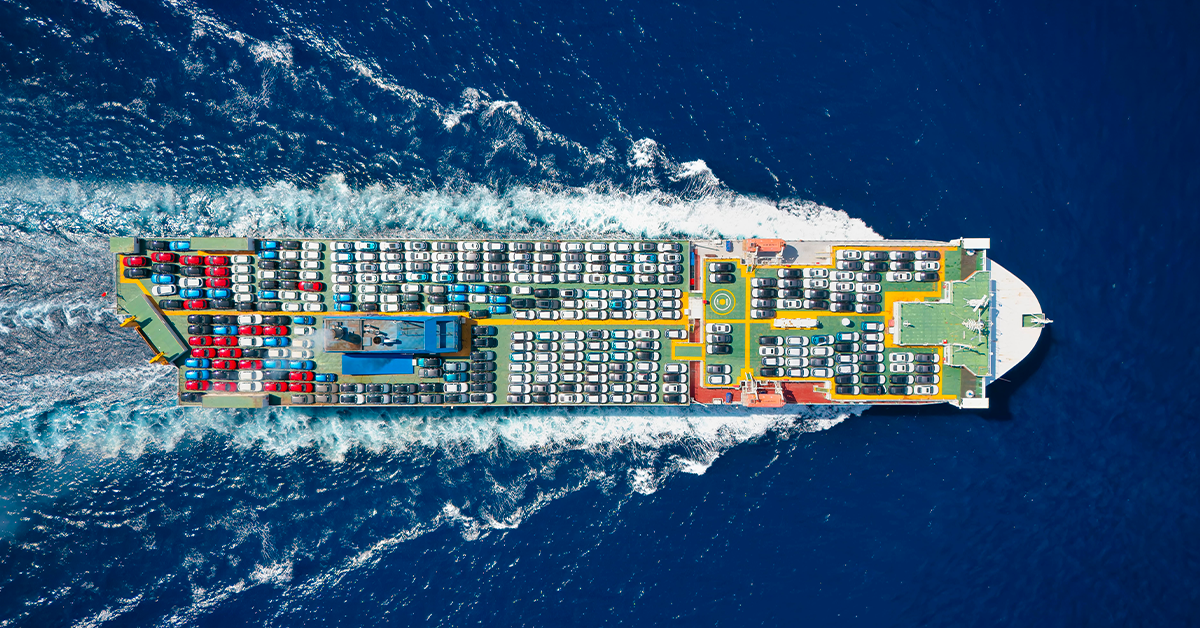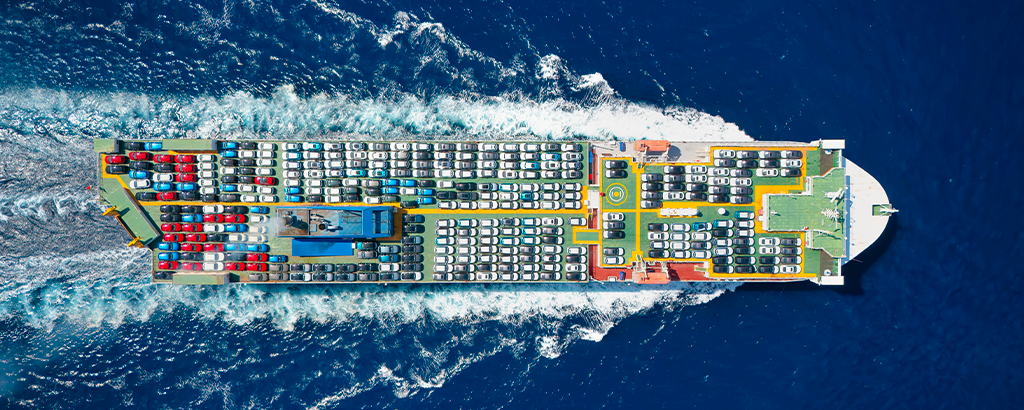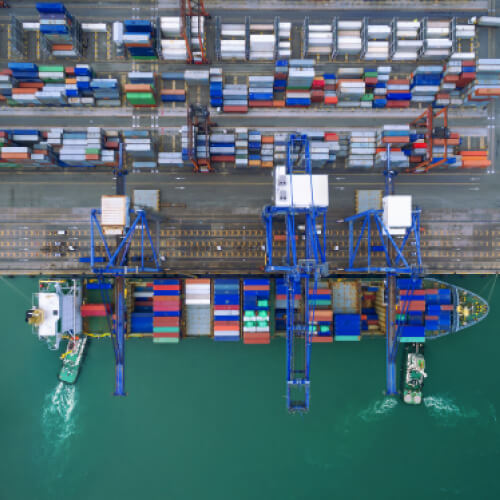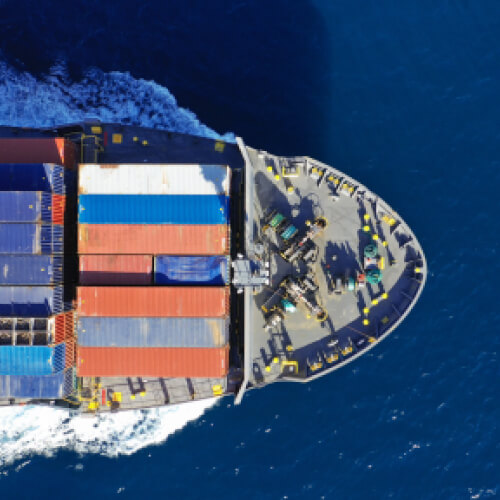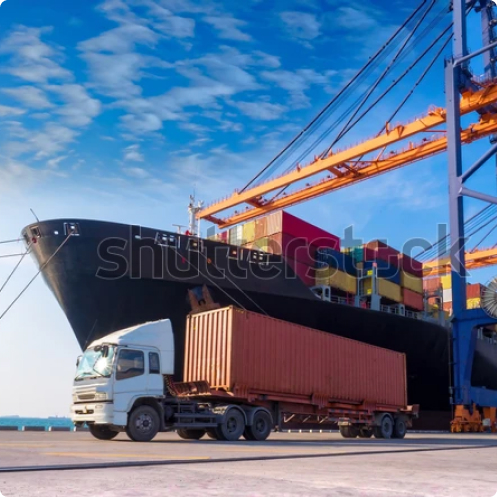RO-RO transport, an acronym for Roll On Roll Off, is a specialized maritime shipping method that allows goods to be loaded and unloaded via mobile ramps, without the need for cranes or special equipment. It is particularly suitable for transporting vehicles, industrial machinery, trucks, and rolling cargo, offering an efficient and practical solution for fast and secure international shipments.
In this article by Savino Del Bene, we will delve into the features, operations, and benefits of this transportation method.
What is RO-RO transport?
RO-RO, literally Roll On Roll Off, describes a specific type of maritime shipment where cargo is loaded and unloaded directly via dedicated ramps. This method is primarily used for vehicles, agricultural and industrial machinery, fully loaded trucks, wheeled cargo, and any other type of cargo that can be loaded onboard using mafi trailers.
RO-RO differs from other methods such as container shipping (Lift On Lift Off – LO-LO) because it doesn’t require vertical handling with cranes, thus reducing operational times and optimizing costs. Additionally, while oceangoing merchant vessels typically measure cargo by weight (tons), RO-RO cargo is usually measured in LM (Linear Meters).
How does RO-RO work?
RO-RO maritime transport follows a well-defined and rapid operational procedure, optimizing safety and efficiency in cargo handling. Let’s look at the main stages of this logistic process.
Preparation and arrival of cargo at the port
Vehicles or rolling cargo to be shipped (cars, trucks, tractors, agricultural, and industrial machinery) are prepared with complete documentation and transported to the dedicated RO-RO terminal. Here, security conditions are verified and loading operations are planned. In case the freight is not rolling cargo, it will be secured on mafi trailers and towed into the vessel holds with port tugs.
Loading cargo onto the RO-RO ship
Cargo is directly loaded onto the ship via integrated ramps (“Roll On”). Vehicles are accurately positioned on internal decks and securely fastened using specialized systems such as chains or straps, ensuring stability during navigation.
Arrival and unloading at the destination port
Upon arrival at the final port, the RO-RO vessel opens its ramps, allowing rapid and direct unloading of the cargo (“Roll Off”). At this stage, customs checks may be conducted, and subsequently, vehicles are directed to dedicated port areas for pick-up or onward land transport.
Delivery and continuation of shipment
After unloading, vehicles or goods are delivered directly to the final recipients or transferred to intermediate logistic facilities.
Choosing an experienced partner such as Savino Del Bene ensures an efficient and accurate service throughout every stage of sea shipping, particularly in sectors like industrial and agricultural machinery.
RO-RO ships: key features
RO-RO ships possess distinctive characteristics making them particularly suitable for transporting rolling cargo, ensuring speed, safety, and operational efficiency. Let’s explore these features in detail:
- Integrated ramps: equipped with integrated mobile ramps allowing quick entry and exit of cargo directly from the dock to the loading deck. This avoids using cranes or vertical lifting systems, significantly speeding up port operations and reducing dock time;
- Multiple and flexible internal decks: RO-RO vessels feature multiple internal decks designed to accommodate vehicles and rolling cargo of various sizes and heights. These spaces are often modular, allowing rapid layout adjustments to accommodate various cargo types, from lightweight vehicles to large industrial machinery;
- Specialized fastening systems: cargo safety during voyages is ensured by specialized fastening systems. Chains, wedges, and straps secure each unit firmly to the ship’s floor, preventing accidental movement even in unfavorable marine conditions;
- Operational efficiency and reduced times: horizontal loading and unloading operations allow RO-RO cargo ships to significantly reduce port operation times compared to other maritime transport types. This efficiency translates into lower operational costs and faster delivery times—significant advantages for companies frequently shipping goods or requiring urgent deliveries;
- Cargo versatility: Another strength of these ships is their ability to easily adapt to diverse cargo types. Cars, trucks, buses, tractors, agricultural, and industrial machinery can all be moved swiftly on the same vessel without structural modifications, making the service suitable for different industries and cargo types.
All these combined features make RO-RO vessels an ideal choice for reliable and cost-effective maritime shipments, especially when handling large quantities of vehicles or industrial machinery.
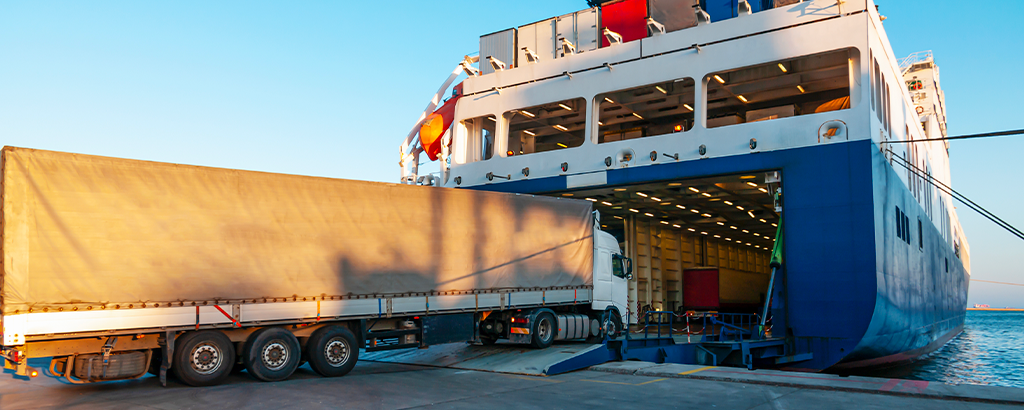
Roll On Roll Off ships: different types
Roll On Roll Off ships are classified into different categories, each designed to meet specific transportation requirements according to cargo types. Let’s examine the main RO-RO ship variants.
PCC (Pure Car Carrier)
PCC vessels are specialized exclusively for transporting automobiles. They feature internal decks with optimized low heights suitable mainly for new or used cars. These ships provide high loading capacity, ensuring the safety and integrity of cars during transit, thanks to standardized and specialized fastening systems.
PCTC (Pure Car and Truck Carrier)
PCTC vessels represent an evolution of PCC ships, designed to carry both cars and larger commercial vehicles, such as trucks, buses, and trailers. Unlike PCCs, PCTCs feature adjustable internal decks, providing greater versatility and adaptability for vehicles of different sizes, enhancing efficiency and space utilization.
ROPAX (Roll On/Roll Off Passenger)
ROPAX vessels combine rolling cargo transport with passenger service, typically operating on short to medium routes. Besides accommodating vehicles and trucks, these ships have passenger areas, including cabins, lounge areas, and catering services. ROPAX ships are ideal for quick connections between nearby ports and islands, providing a comprehensive and practical solution for combined passenger and cargo traffic.
RoLo (Roll On Lift Off)
RoLo ships represent a hybrid solution between traditional RO-RO vessels and those equipped with cranes for vertical loading (LO-LO). These ships offer greater flexibility, handling both rolling cargo through integrated ramps and more complex cargo requiring vertical lifting, such as containers or specialized machinery. This combination makes them particularly valued in industries handling mixed or specialized cargo.
ConRO (Container Roll On Roll Off)
ConRO ships are specifically designed to combine RO-RO and containerized transport. Equipped with internal decks with dedicated ramps for rolling cargo and separate areas for containers, these ships meet complex and diverse requirements. ConRO vessels are particularly suitable for companies managing mixed logistic flows, optimizing shipments, and reducing overall transportation costs by combining different cargo types on a single vessel.
Each of these RO-RO ship variants offers tailored solutions to various international maritime transportation needs, enabling precise choices based on cargo type and shipment volume.
Maritime RO-RO transport: advantages offered
Choosing maritime RO-RO transport offers numerous benefits, making it particularly advantageous for international shipments of rolling cargo. Let’s examine the main advantages:
- Operational speed: RO-RO transport guarantees fast operational times due to easy and quick cargo loading and unloading directly via integrated ramps, eliminating the need for cranes or complex vertical handling systems;
- Optimized costs: reduced port dwell times and eliminating special equipment for vertical cargo handling significantly reduce operational costs, making RO-RO transport highly competitive economically;
- Enhanced cargo safety: horizontal cargo handling and specialized anchoring systems limit the number of cargo manipulations, significantly reducing the risk of accidental damage during loading, transit, and final unloading;
- Cargo versatility and flexibility: RO-RO ships allow simultaneous transport of various rolling cargo types, from simple vehicles to large industrial and agricultural machinery. This versatility enables rapid adaptation of transport logistics to various business needs;
- Reduced risk of accidents and damages: simplified and direct handling significantly reduces manual and mechanized operations, decreasing the incidence of accidents and damages.
These aspects make maritime RO-RO transport a reliable, cost-effective, and secure solution for efficiently managing international shipments of vehicles, machinery, and other rolling cargo.
Conclusion
RO-RO transport represents a highly efficient and secure solution for moving rolling cargo, vehicles, and machinery internationally. Opting for this transport mode means choosing speed, cost-effectiveness, and reliability. To fully capitalize on these opportunities, partnering with an experienced and reputable logistics provider is essential.
Savino Del Bene is a recognized specialist in international shipping. If you seek an efficient, safe, and punctual RO-RO service, consider entrusting your shipments to us. Contact your local Savino Del Bene representative today for tailored advice for your business.

